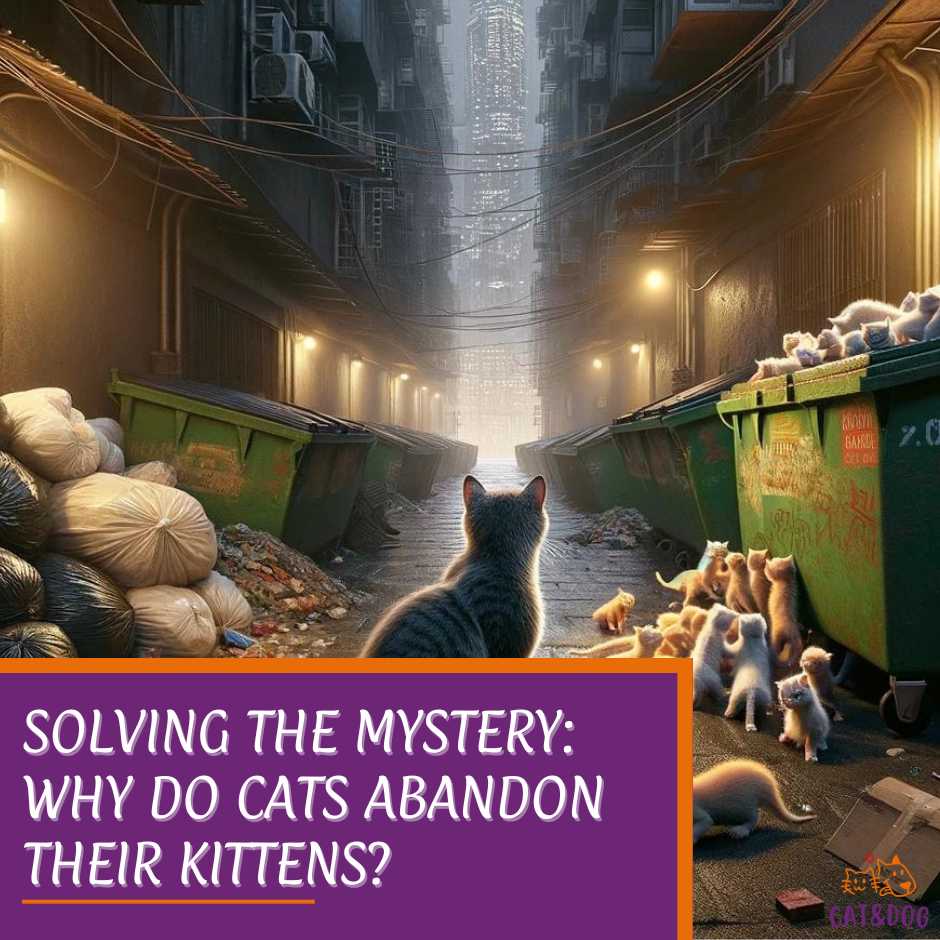Imagine you’re a new mother cat, caring for your litter with all the love and attention characteristic of feline maternal instincts.
Suddenly, you observe one of your kittens is left aside, no longer part of the warm, purring heap of siblings.
This might be puzzling, right? We need to understand why cats abandon their kittens. By doing so, we foster a more compassionate and informed human-cat relationship.
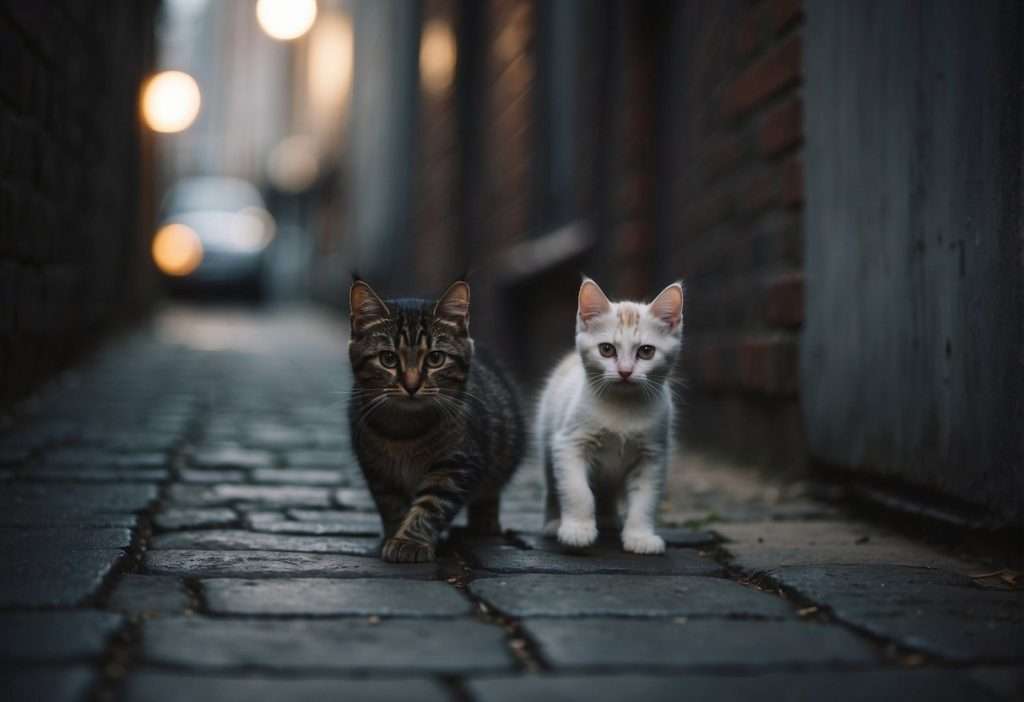
Mother cats are generally attentive and nurturing, but various factors can lead to the tough decision of abandoning a kitten or even an entire litter.
These factors can range from stress and inexperience to health issues. It’s a behavior that might seem cruel, but in the wild, it’s all about survival.
Recognizing these reasons not only helps us intervene if necessary but also improves our bond with our feline companions.
However, if you come across a mother cat who has abandoned her kittens, it’s important to reach out for help from your local shelter, rescue group, or veterinarian.
And remember, even though kittens are adorable, over 4 million animals are euthanized annually in the U.S. due to overpopulation. Please spay or neuter your pets to help combat this issue. (1)
Key Takeaways
- Understanding a cat’s reason for abandonment helps improve the cat-owner bond.
- Knowing factors like stress and health issues can inform how we care for kittens.
- Recognizing maternal behaviors aids in compassionate responses to abandonment.
Understanding Why Do Cats Abandon Their Kittens?
Firstly, mother cats, just like any mom, want the best for their offspring. Their maternal instincts usually kick in after giving birth, keeping their kittens fed, warm, and safe.
But sometimes, things don’t go as one might expect.
- Stress: If a mama cat is feeling the pressure, whether it’s from a too-busy environment or the presence of predators, she might pack her bags. Cats crave safety, and a stressed cat is like a long-tailed cat in a room full of rocking chairs—always on edge.
- Illness or weakness: Occasionally, a mother cat might sense that a kitten has health issues or is less likely to thrive. It’s a tough pill to swallow, but in the wild, this instinctive decision can free her to care for the stronger kittens.
- It’s time to learn: Believe it or not, once kittens reach a certain age, a mother cat might take a step back to encourage independence. You know, the whole ‘teach a man to fish’ philosophy, but with more whiskers and meowing. (2)
Now, before you go thinking that cat moms are cold, remember—they’re just doing cat things for cat reasons. Here are some of those reasons in a nutshell:
- Seeking a safe space
- Ensuring the survival of the fittest
- Teaching independence
Cats will only abandon their kittens if they feel like they are in danger or if they don’t have a safe place to keep them.
In most cases, stray moms will move their kittens to a safe place and go out to look for food. It is best not to handle the kittens you find if they are in a safe place.
If the kittens seem healthy and well-fed, it means that the mother is nearby and is taking care of them.
It’s important to monitor a nest for a couple of hours to see if the mother cat, including stray moms, returns before intervening.
First-time mothers may lack the necessary experience to care for their young.
Additionally, if the mother feels threatened or stressed, she may abandon her litter of kittens, especially if she is a young female cat, to protect herself.
Sometimes, the kittens may have a viral or bacterial illness, and the mother may sense this and decide to leave them behind due to the risk of spreading the illness, resulting in a low chance of survival.
In other cases, the mother cat might have been separated from her kittens due to human intervention or natural causes like a predator attack or accidental separation.
Understanding the reasons why cats abandon their kittens, including the risk of bacterial illness and low chance of survival due to predation, can help us better care for these animals and prevent kitten abandonment. (3)
Cats may abandon their kittens for various reasons, including stress, illness, or being unable to provide enough food.
If you find abandoned kittens, the best way to care for them is to contact your local animal rescue organization or vet.
They will provide the necessary care and support needed for the kittens to survive and thrive.
It’s also important to prevent unwanted litter of kittens by spaying or neutering your cat, which can help reduce the number of homeless cats in the world.
The Psychology Behind Maternal Abandonment
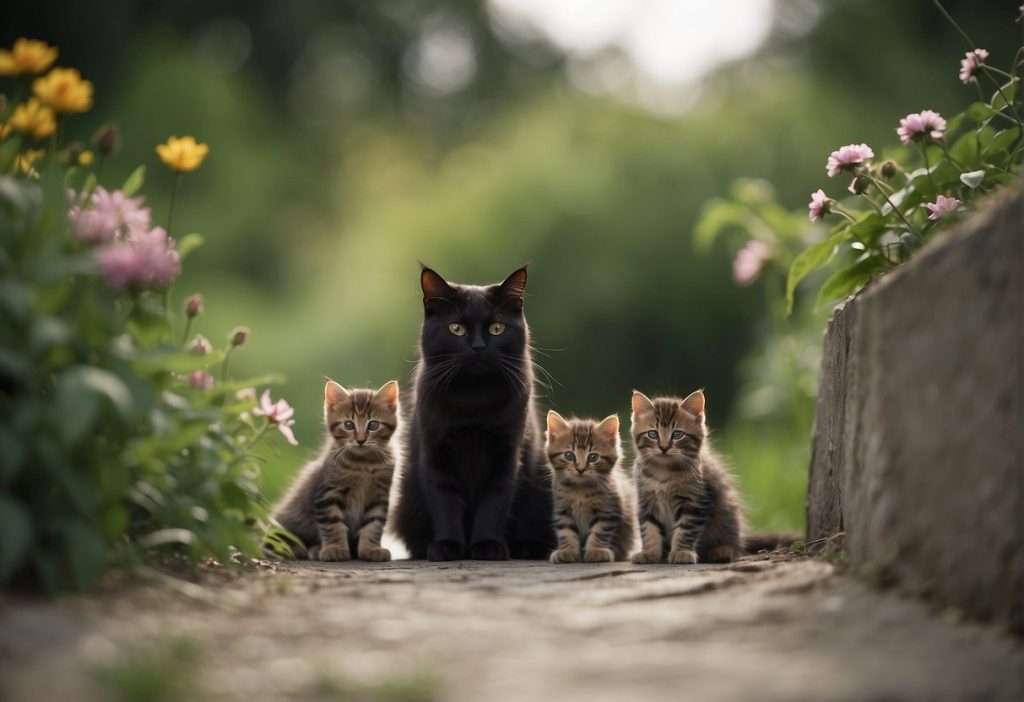
Stress, for one, is a huge factor. Imagine you’re a cat: any big change in your surroundings is like a puzzle you didn’t sign up for. (4)
If Mama Cat feels the heat, her instincts might nudge her to find a calmer space, leaving the little ones behind.
Now, consider health issues. Sometimes, self-preservation kicks in, and a mother might isolate a sick kitten, perhaps to keep the rest of the litter safe. It sounds harsh, but in the wild, it’s about survival, isn’t it?
Let’s talk resources – or the lack thereof. Living the life of a cat, if you sense the pantry is perennially bare, instinct might tell you that you can’t support your fuzzy offspring. Here’s what happens:
- Search for food: Without enough noms, a cat may prioritize self-care over kitten care.
- Shelter quest: A safe home is essential, and if it’s not there, it’s time for a cat to hit the road.
But there’s a flip side: not all cats have this worldview hardwired into them. Some, thanks to the magic of genetics, are model mothers.
Passed down through generations, these super-mom genes make nurturing a knee-jerk reaction.
While wild cats have their instincts as a guide, domestic divas might rely more on what they’ve learned. So if you’ve been a fabulous pet parent, chances are your kitty will mimic that.
Remember, it all comes down to nature and nurture. Mother cats balance on the edge of what they instinctively know and what’s taught. You get it, right?
Just like us, every cat’s story is unique, and understanding them means peering into a world where instinct and experience collide.
Strengthening the Human-Cat Bond
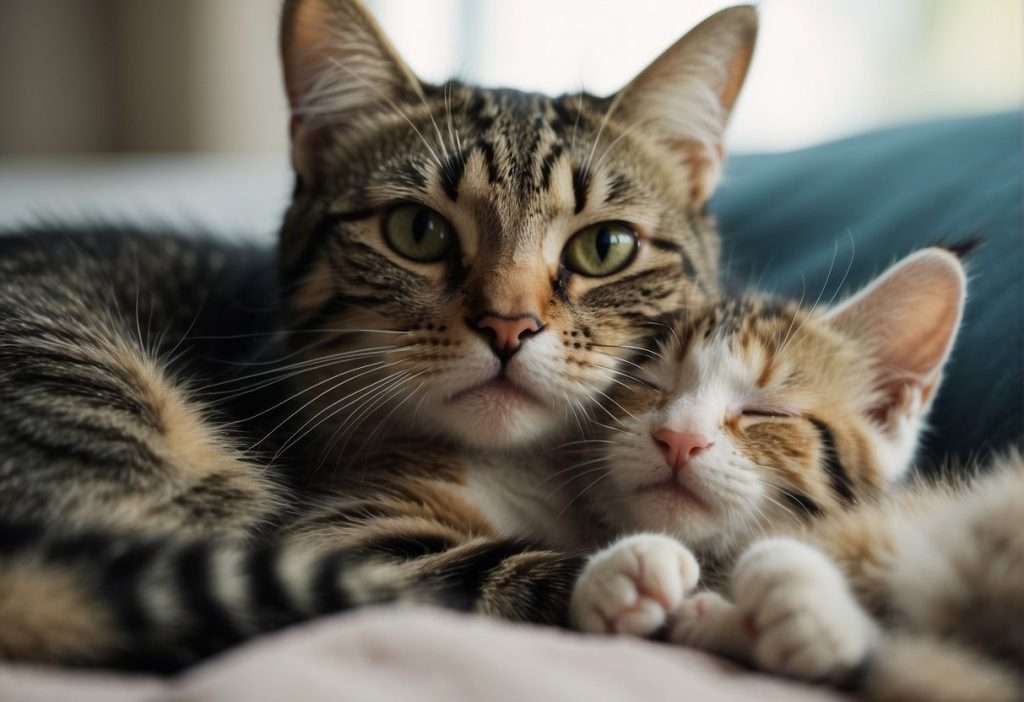
Just like their enchanting hum, your support as a pet parent plays a crucial role in the well-being of mother cats and their kittens.
Your goal? Create a secure and loving environment that feels like a sanctuary for the feline family.
Before the Birth
Start by setting up a cozy nesting area. Cats love privacy, especially when expecting! A quiet corner with a comfortable box lined with soft blankets is ideal.
- Keep the space clean and stress-free.
- Limit excessive noise and foot traffic.
- Ensure other pets keep their distance so mom feels safe.
During the Birthing Process
While mother cats are often independent, your gentle presence can be reassuring. But remember, it’s best to keep your curiosity in check—hovering could make mommy anxious. (5)
- Peek occasionally, but don’t intrude.
- Provide fresh water and a nutritious meal to keep mom’s energy levels up.
After the Kittens Arrive
This is when you play the part of a nurturing assistant:
- Maintain a steady supply of food and water.
- Clean the nesting area regularly without disturbing the newborns.
Positivity is Key
Positive interactions are a big deal. Approach mom and babies with a calm voice and gentle touch. Your tranquil demeanor can help ward off any potential for stress-related abandonment.
The comfort you provide momma by just being a steady presence tells her she’s not alone in this new chapter.
Remember, a little goes a long way. A dash of patience, a sprinkle of care, and a whole lot of love are the ingredients for a strong human-cat bond.
It’s this bond that can transform a simple corner of your home into a nurturing paradise for the little fur family. Isn’t that a purr-fect picture?
And don’t forget to provide your furry friend with high-quality cat food to keep them healthy and happy!
Practical Tips for Cat Owners
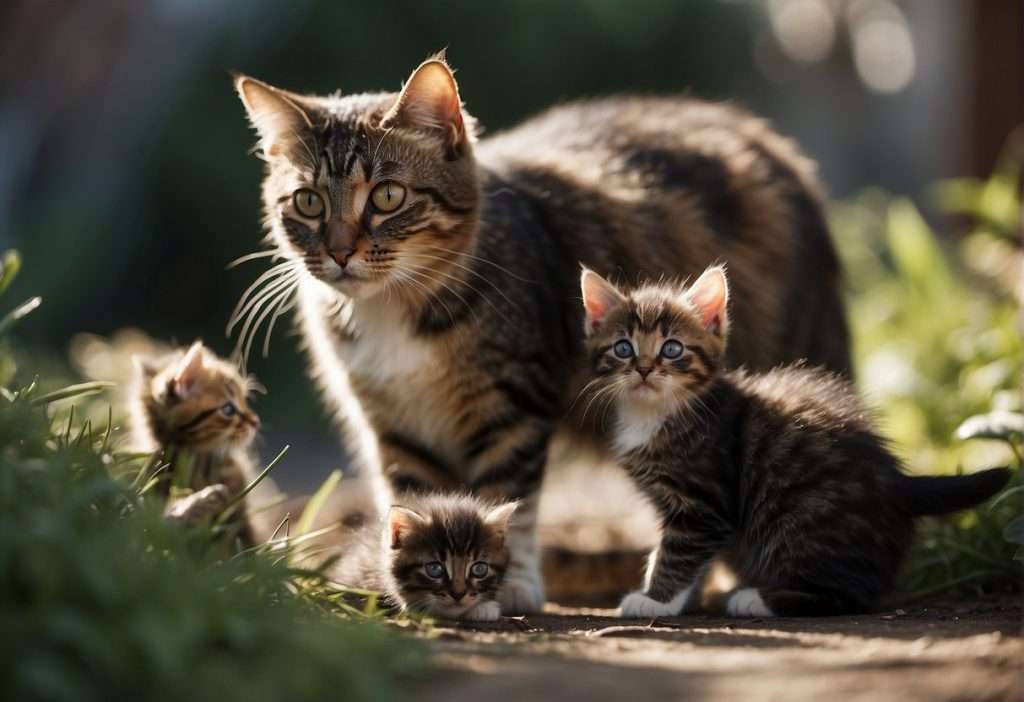
Fret not, I’ve got your back with some handy tips to tackle these feline predicaments.
Found Abandoned Kittens?
- Do:
- Check if they’re abandoned. Sometimes, Mama Cat is just out hunting or taking a break. Wait and watch from a distance.
- Provide warmth. Kittens can’t regulate their body temperatures. Use a soft blanket or a heating pad on a low setting.
- Seek veterinary care. These little critters might need vaccines, a health check-up, or special nutrition.
- Don’t:
- Immediately interrupt. Give Mama Cat a chance to return. Disturbing the nest too soon may deter her.
- Overfeed. Stick to a schedule and feeding guidelines from a vet. Their tiny tummies are delicate!
Supporting a Nursing Mom
- Do:
- Offer a private space. Set up a cozy, quiet spot away from household bustle. Think a comfy cat bed in a spare room.
- Maintain nutrition. High-quality kitten formula or a vet-recommended diet does wonders for nursing queens.
- Don’t:
- Disturb the family. Too much poking around can stress Mom out.
- Ignore the vet. Regular check-ups? Yes, please! They’re pivotal for the clan’s well-being. (6)
Remember, patience is a virtue here, and your kindness can make all the difference. Trust me; your feline friends will thank you with purrs of gratitude. Now, let the cuddle fest begin!
Health Implications of Maternal Abandonment
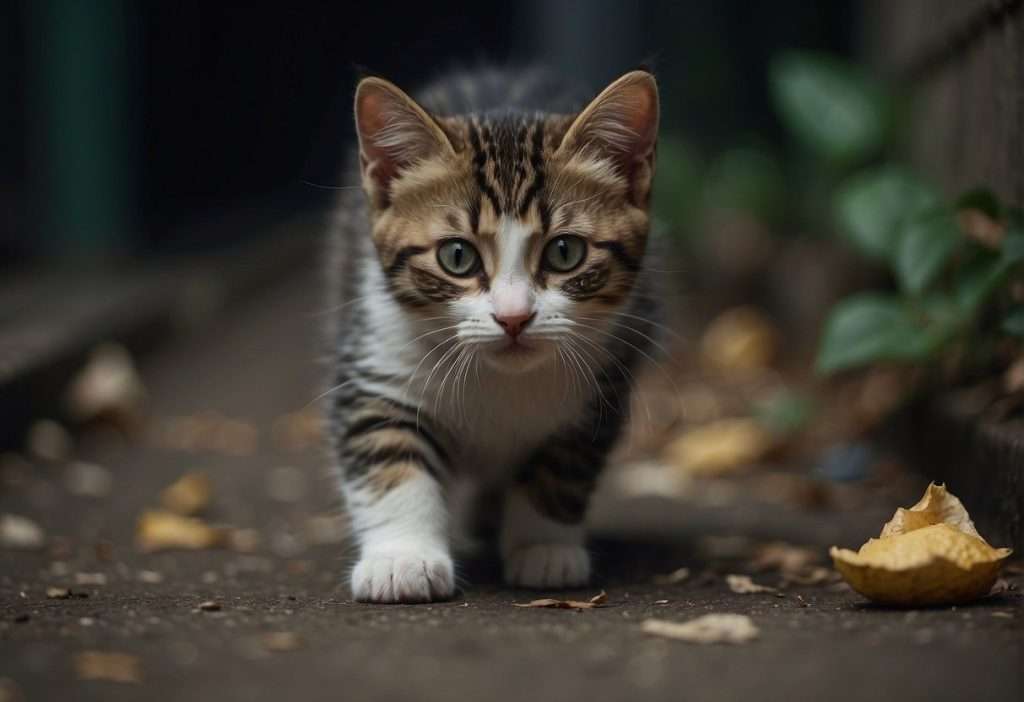
Here’s the scoop – there’s a truckload of health implications that come into play when a very young mom, who hasn’t developed maternal skills, abandons her kittens too soon, leaving them as orphans with potential health issues such as mastitis, an infection of the mammary gland that can cause pain and swelling in the nipple.
If there is not enough milk for all her kittens, the mom may reject a few to save milk for the others, leading to potential health issues for the rejected kittens, including rejection and abandonment due to her hyper-vigilance and nervousness.
A careful observer will probably notice this behavior within the first 24 hours of birth.
It is important to seek veterinary care to quickly treat this bacterial infection, as it can worsen and cause serious sickness if left untreated, to ensure the health and well-being of both the mother and her kittens.
First up, let’s talk physical health. Kittens thrive on their mother’s milk, which is like a liquid gold, packed with nutrients and antibodies.
If abandoned, kittens miss out on this, and their immune systems may wave the white flag against infections.
- Keep an eye on the kitten’s body temperature
- Signs of weakness or lethargy
- Any unusual crying that could signal distress
Next, let’s not forget about psychological well-being. Kittens learn a lot from their mom – think of her as the ultimate feline sensei.
She teaches them survival skills, how to socialize, and all the rites of passage into cat-dom. Without this guidance, kittens can grow up jittery or even a bit antisocial. Not the coolest outcome, right?
- What to monitor: How well kittens interact with humans and other pets
- Their play behavior – it’s not just cute, it’s necessary for learning
- Signs of excessive fear or aggression
Now, what about mama cat? If she’s under stress or not in shipshape, she might bail on her babies. It’s tough, but it’s often nature’s hard-nosed way of ensuring survival.
If you suspect a feline mom is stressed, a check-up could save the day!
Lastly, your vigilant eyes are their best bet. Keep those kittens snug, watch for growth milestones, and if in doubt, a vet’s advice is golden.
Just remember, a helping hand from you can make a world of difference for these tiny creatures, so stay observant and proactive! (7)
Adding Humor and Relatability to Cat Care
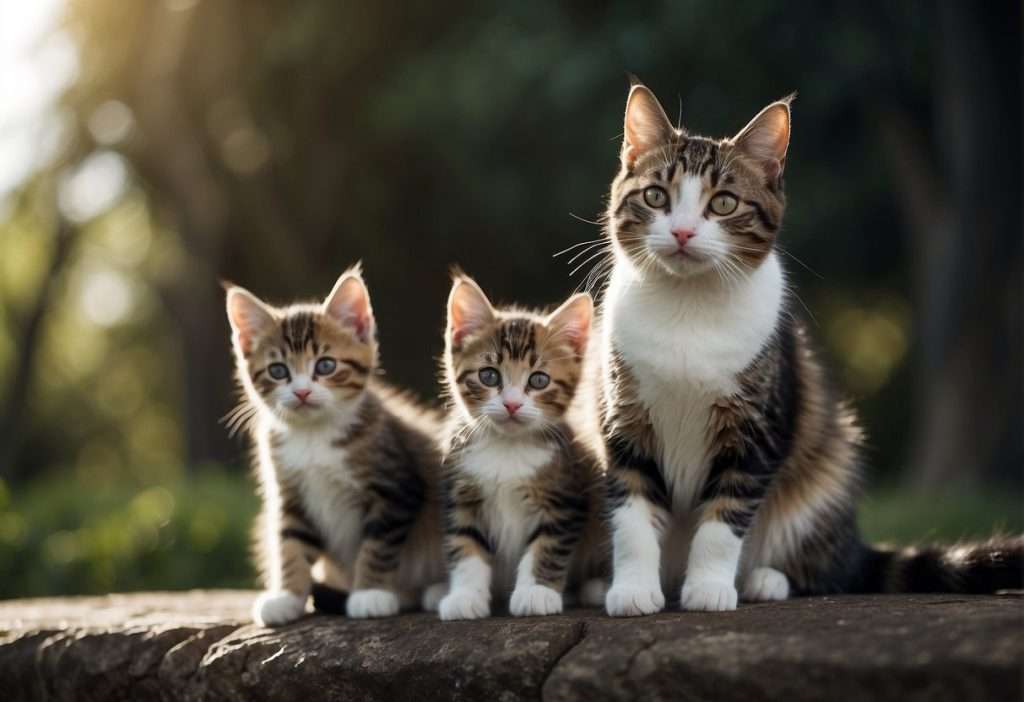
Have you ever noticed your cat staring blankly at a wall, seemingly deep in thought? Well, imagine their inner dialogue when dealing with kittens.
“To feed or not to feed, that is the question. Oh, look, a laser dot!” Cats often switch between dutiful parents and aloof teenagers with an identity crisis faster than you can say “nip-induced hallucination.”
Here’s a fun fact to share at your next cat lovers’ meetup: Stress in cats can be like an overworked office worker who’s had one too many coffees—frantic and a little unpredictable.
Just like us, when cats feel the crush, they might need a break from their responsibilities. Remember, if you see a momma cat on a so-called ‘vacation’ from her kittens, she’s likely just decompressing!
- Funny Stories From the Litter Box:
- Tale #1: A first-time mother cat was observed returning to her litter after a ‘break’ with a stolen toy from the neighbor’s pet—a clear sign of a feline mid-kitten crisis.
- Tale #2: A young kitten was found cuddling a furball it mistaken for its mother—talk about identity confusion!
And before you get too judgemental, think back to the last time you misplaced your keys and retraced your steps like a detective in a noir film.
Cats may abandon their kittens for a moment, but they’re generally back on the case after solving the mystery of the missing cat toy in a short while.
So, next time you’re witnessing cat-parenting chaos, grab some popcorn and enjoy the quirky natural sitcom that is cat life.
Just don’t forget to show our furry friends some love and understanding; after all, they put up with our human shenanigans daily!
Prioritizing Cat Health and Well-being
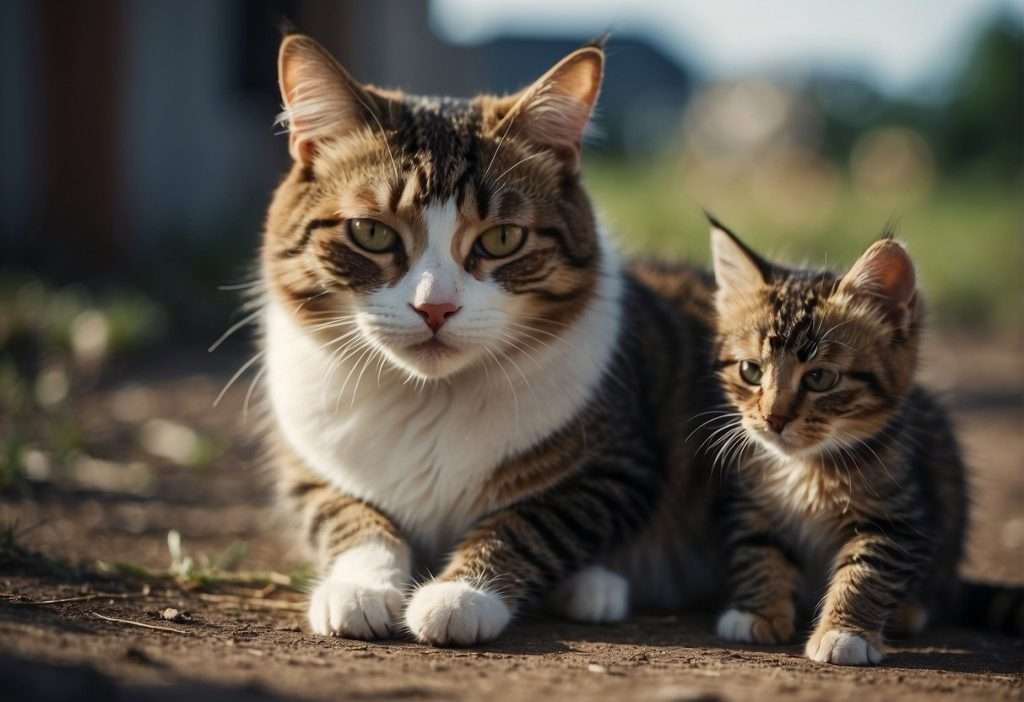
Stressed Much?
Just like you, your purring pal can get stressed! Imagine adding the pressure of caring for a litter. What’s a cat to do? It’s simple: stress reduction. Create a chill zone with these steps:
- Safe Spaces: Ensure mama cat has a quiet, cozy corner, away from the hustle and bustle.
- Routine Rules: Keep feeding time and playtime as regular as clockwork. Cats love predictability!
Mental Gymnastics
Our whiskered companions need more than a comfy bed; they crave mental stimulation. Consider these options:
- Toys & Puzzles: Encourage natural hunting instincts with toys that mimic prey.
- Climbing Structures: Cats are natural climbers. A cat tree can be the Mount Everest in their world.
Keeping your cat both physically and mentally fit is like hitting two birds with one stone.
It reduces the chances of your feline feeling overwhelmed and, in turn, this can decrease the instinct to abandon her kittens. No exaggeration here—it’s just pure, simple cat logic.
So, give your cat the best shot at a stress-free life. Who knows, it might just lead to one big, happy fur family!
Remember, it’s not about spoiling them—it’s about meeting their needs. You’ve got this!
Quick Recap
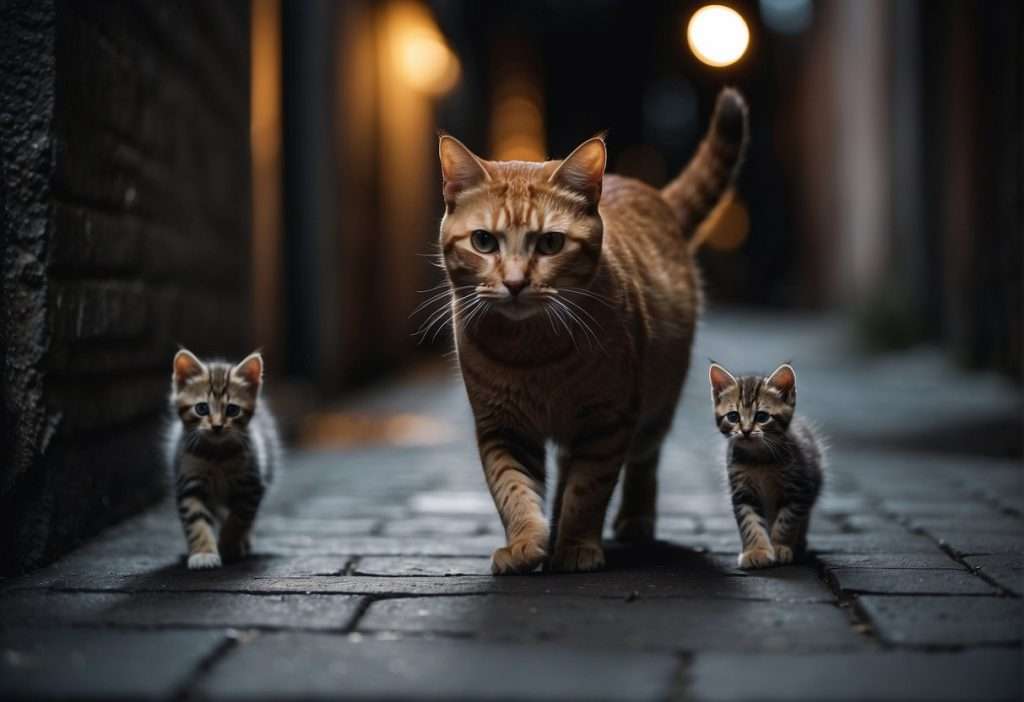
Stress: Just like you might need a break when the world spins too fast, mother cats can feel overwhelmed by their environment. If the stress meter peaks, they might seek a calmer space, leaving their young behind.
- Environment changes
- Feeling threatened
- Health of the Kittens: No one likes seeing anyone sick, and mother cats are no exception. A kitten with health issues might be heartbreaking for you and also deeply concerning for a cat mom, possibly leading her to make that tough decision to leave it behind.
- Poor kitten health or deformities
- Survival Instincts: It’s a wild world out there, even for a domestic cat. Sometimes, to ensure the survival of the majority, a mother cat may need to make the difficult choice to abandon a sickly kitten.
- Focus on healthy offspring
- Feline Personality: Cats are complex creatures. Even though they’re often independent, their motherly instinct is strong. Yet, circumstances can override instincts, causing some cats to step away from their motherly duties.
- Variability in maternal behavior
- Insecurity and Threat: Just like you’d probably protect your home, a mother cat wants a safe space. If she doesn’t find it, her kittens’ safety may feel compromised, leading her to abandon them.
- Searching for safety
Remember, these are just a handful of the reasons, and they’re never made out of malice. As a thoughtful cat owner or animal lover, you should approach feline behavior with empathy.
Learn more about our feline friends and support other cat owners in creating nurturing environments. Bond with your pet, and ensure they feel secure and loved.
Your informed care could be the difference that keeps a cat family together.
Frequently Asked Questions
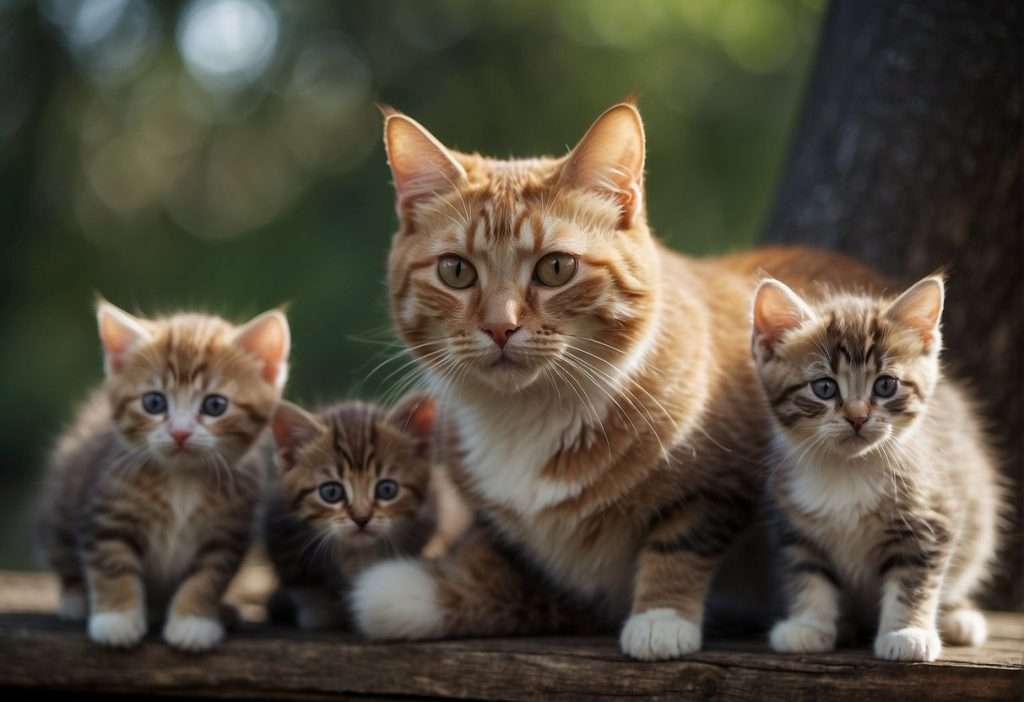
When it comes to kittens being abandoned by their mom, you’re probably wondering why it happens and what to do. Below, you’ll find answers to some burning questions about this tender topic.
What are the most common reasons a mother cat might abandon her kittens?
Mother cats can leave their kittens for various reasons, including stress, feeling threatened, illness or defects in the kitten, or insufficient resources.
Survival instinct sometimes drives a mother cat to focus on her well-being if she’s unable to care for her offspring.
How can I tell if a kitten has been abandoned by its mother?
If you stumble upon a kitten and wonder if it’s a case of abandonment, check for signs like continuous crying, lack of cleanliness, or being cold to the touch.
Mother cats might leave to feed, so watch to see if she returns.
What should I do if I find abandoned kittens?
Upon finding kittens that seem to be without their mom, it’s key not to jump to conclusions.
Monitor from a distance to see if the mother returns. If she doesn’t come back, contact a local vet or animal shelter for guidance on how to proceed.
Can human intervention cause a mother cat to abandon her kittens?
Yes, sometimes well-meant human interaction can spook a mother cat, causing her to leave her kittens.
If you need to handle kittens for their safety, try to leave evidence of your scent as little as possible and return them to the same spot.
How soon can abandoned kittens be adopted into new homes?
Adoption should only be considered when kittens are at least 8 weeks old, which is when they can eat solid food and are socialized enough to be away from their mom.
Kittens younger than this generally require foster care with specialized feeding and care.
What are the health risks for abandoned kittens?
Abandoned kittens face risks like hypothermia, malnutrition, and dehydration.
Without their mother’s antibodies, they’re more susceptible to infections and diseases.
They need prompt medical attention and caregiving to improve their survival chances.

